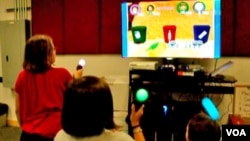Health experts have long known that video games can be helpful in the treatment of various medical conditions. Now, U.S. researchers are developing an electronic game specifically designed for children with cancer that empowers them to use their minds and bodies to fight their disease.
Video games are nothing new in the treatment of childhood illnesses. Electronic games are used in therapeutic settings to raise asthma awareness and encourage medication use among youngsters, and popular games such as WII Fit promote physical activity, helping get overweight children at risk of diabetes up and moving to lose weight. Such games have been shown to help kids take control of and manage their health conditions.
Now, researchers at the University of Utah School of Medicine have designed a computer simulation game specifically for children with cancer. The prototype uses a controller from Sony's Play Station 3 console, and allows young cancer patients to select a character, or avatar, to represent them in five challenging scenarios.
Pediatric cancer specialist Carol Bruggers helped develop the simulation.
"One is a crab bash game, and one is a trash pickup game, one is under the boardwalk, one is a crab throw game and one is building a defense wall," she said. "And these vignettes are cartoon representations of different aspects of fighting a disease."
Bruggers says the suite of games, which has the very unexciting name, Patient Empowerment (PE) has been well-received in a trial involving a small group of cancer patients.
In her study, Bruggers says her long-term goals for these children are to develop resilience as measured by brain activity, and to improve physical and cardiovascular conditioning, which can mean shorter hospital stays.
Still to be determined, according to Bruggers, is whether kids with cancer who play games such as PE have better outcomes.
"One thing that we are really excited about is just thinking in terms about self-empowerment, control over one's diseases," she noted. "Our hope is that it's not limited to pediatric oncology patients. Our hope is that it can be used in diverse populations with all kinds of diseases."
Bruggers' ultimate goal is to tailor PE to patients both in and out of the hospital, with a wide variety of ailments, including neurological stroke, Parkinson's disease and memory problems.
A commentary describing the Patient Empowerment game, developed by Carol Bruggers and colleagues at the University of Utah, is published in the journal Science Translational Medicine.
Video games are nothing new in the treatment of childhood illnesses. Electronic games are used in therapeutic settings to raise asthma awareness and encourage medication use among youngsters, and popular games such as WII Fit promote physical activity, helping get overweight children at risk of diabetes up and moving to lose weight. Such games have been shown to help kids take control of and manage their health conditions.
Now, researchers at the University of Utah School of Medicine have designed a computer simulation game specifically for children with cancer. The prototype uses a controller from Sony's Play Station 3 console, and allows young cancer patients to select a character, or avatar, to represent them in five challenging scenarios.
Pediatric cancer specialist Carol Bruggers helped develop the simulation.
"One is a crab bash game, and one is a trash pickup game, one is under the boardwalk, one is a crab throw game and one is building a defense wall," she said. "And these vignettes are cartoon representations of different aspects of fighting a disease."
Bruggers says the suite of games, which has the very unexciting name, Patient Empowerment (PE) has been well-received in a trial involving a small group of cancer patients.
In her study, Bruggers says her long-term goals for these children are to develop resilience as measured by brain activity, and to improve physical and cardiovascular conditioning, which can mean shorter hospital stays.
Still to be determined, according to Bruggers, is whether kids with cancer who play games such as PE have better outcomes.
"One thing that we are really excited about is just thinking in terms about self-empowerment, control over one's diseases," she noted. "Our hope is that it's not limited to pediatric oncology patients. Our hope is that it can be used in diverse populations with all kinds of diseases."
Bruggers' ultimate goal is to tailor PE to patients both in and out of the hospital, with a wide variety of ailments, including neurological stroke, Parkinson's disease and memory problems.
A commentary describing the Patient Empowerment game, developed by Carol Bruggers and colleagues at the University of Utah, is published in the journal Science Translational Medicine.





